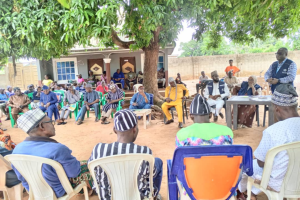Benue State, WHO expands Lassa Fever response with community-level outreach campaigns
Makurdi, Lassa fever continues to pose a major public health challenge in Nigeria and across West Africa. Between 1 January and 10 August 2025, Nigeria reported more than 6939 suspected cases, including 849 confirmed cases and 159 deaths. Globally, Lassa fever remains a recurring epidemic threat in West Africa, with countries such as Liberia, Sierra Leone, and Guinea also reporting cases in recent years.
As part of the efforts to curb transmission in Nigeria, the World Health Organization (WHO), in collaboration with the Benue State Ministry of Health and Human Services, has launched targeted sensitisation campaigns in 45 high-risk communities across five wards in Makurdi Local Government Area. The campaign engages residents in everyday spaces—including markets, places of worship, and community gathering points—to improve early detection and promote life-saving prevention practices.
WHO support strengthening communities’ response
The intervention is being led by Benue State’s Public Health Emergency Operations Centre (PHEOC) and Lassa Fever Technical Working Groups (TWGs), with technical and logistical support from WHO. To implement the campaign, WHO trained 91 health workers and community volunteers, equipping them with tools and information to engage households, answer questions, and deliver simple prevention messages.
“Lassa fever has been a recurring threat to our people,” said Dr Asema Paul, State Epidemiologist at Benue State PHEOC. “Sensitisation is critical in breaking the cycle of transmission. By bringing prevention messages to everyday spaces and training local health workers and volunteers, WHO is helping us build a community-led defense against the disease.”
Dr Asma’i Zeenat, WHO North Central Zone Coordinator, emphasised: “Treatment is costly and mortality is high, but prevention is far more effective. This is why we are engaging gatekeepers at the community level to help protect families and save lives.”
Impact at state level
Benue State is among Nigeria’s highest-burden states. In 2024, the state reported 1,051 suspected cases and 67 confirmed cases of Lassa fever. As of 10 August 2025, 155 suspected cases and 14 confirmed cases have already been reported, with five associated deaths and a concerning 36 % case fatality rate.
Community leaders have welcomed the outreach. His Royal Highness Clement Kulugh, Mue Ter Masev of Ugondo Community, commended the initiative:
“People should share the message on precautions to prevent Lassa fever—store food properly, ensure hygienic practices, and tell others what they have learned. WHO and the government are here for the good of the people.”
Messages that save lives
The outreach campaigns emphasize:
Storing food in sealed, rodent-proof containers.
Keeping homes and surroundings clean to deter rodents.
Seeking care immediately when symptoms appear.
Community voices highlight the change in knowledge and behaviour. “Before now, I didn’t know rodent-bitten food could make us sick,” said Ms Mngutswen Joy, a student in Fiidi community. “Now I will store food in sealed containers and share this knowledge with others.”
Mr Ayangeor Terlumun Destiny, a 25-year-old trader, said: Before now, I never took the time to learn more about Lassa fever. This health talk made me realise the dangers of the disease, the preventive measures, and its symptoms.
Taking the fight to everyday spaces
By meeting people in places where they live, work, and worship, the campaign has reached more than 100,000 people using locally adapted messages, storybooks, and illustrated materials. Market traders, worshippers, and families are now better equipped to prevent infection and seek care early.
Global and national outlook
WHO continues to support the Government of Nigeria to strengthen surveillance, improve case management, and drive risk communication at national and subnational levels. These community campaigns in Benue State are part of a broader global strategy to reduce the impact of viral haemorrhagic fevers in West Africa by strengthening preparedness and engaging communities at the frontline.
In the long term, WHO and the Benue State Ministry of Health will continue to scale up periodic sensitisation through community outreach and mass media, contributing to Nigeria’s national goal of reducing deaths from epidemic-prone diseases and building resilience against recurring outbreaks.



